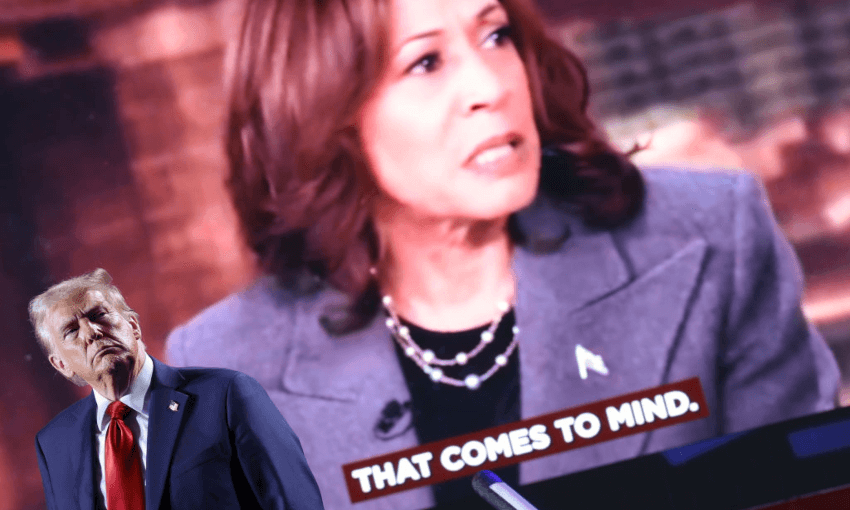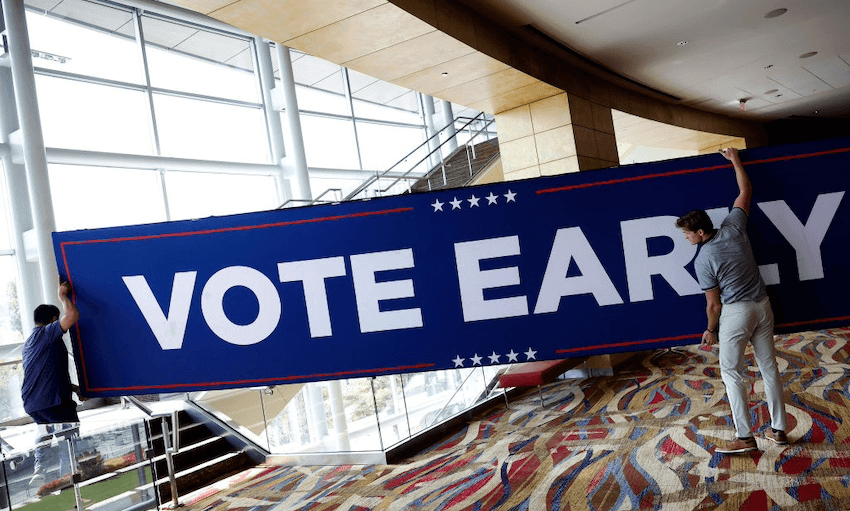When will we know the US election results in New Zealand?
And everything else you need to know about timings, where and what to watch in our user’s guide to the Trump v Harris big day(s).

One ancient candidate ejected after a catastrophic debate performance, another shot in the head in a horrific, failed assassination attempt. Racism, misogyny, plausible claims of fascistic tendencies. Many, many cats – whether owned by ladies or (falsely claimed to be) eaten by immigrants. Yes, it’s been a quiet time over recent months, with the gusset of democracy in the free world stretched to splitting point, and at last we are at the end. Or the end, at least, of the campaign, which marks the start of things unknown
Say, can you see, by the dawn’s early light? Yes, it’s election day in America, with Donald Trump and Kamala Harris vying to become president. Does that star-spangled banner yet wave o’er the land of the free and the home of the brave? We’re about to find out. Here’s everything you need to know.
When is election day in America in New Zealand?
A clumsy question, but an important one. Federal elections are held in the United States on the first Tuesday after the first Monday in November. Which in effect means the first Tuesday in November unless that Tuesday is November 1.
New Zealand, however, is advanced. That is, we’re currently 16 to 23 hours ahead of the various slices of the US. Which means, essentially, in New Zealand, the US election is the first Wednesday after the first Tuesday after the first Monday in November.
So while most of the action in New Zealand will unfold on Wednesday November 6, there will be action to follow on Tuesday, too.
When do the first polls close?
Polls close in parts of Indiana and Kentucky from noon in New Zealand on Wednesday (6pm Tuesday Eastern Time), but 7pm ET (1pm on Wednesday in NZ) is the time to set your alarm for the first polls closing across six states. Among them is the swing state (AKA “battleground seat”) of Georgia, with its 16 electoral college votes.
And the other swing states?
In North Carolina polls close at 7.30pm ET (1.30pm NZ Wed), with Pennsylvania and almost all of Michigan at 8pm ET (2pm NZ). Wisconsin and Arizona: 9pm ET (3pm NZ). And in Nevada the polls slam shut like a pawn shop grill at 10pm ET, or 4pm on Wednesday afternoon in New Zealand.
What’s the latest polling in those swing states?
At time of publication the polling average (per 538) has Trump ahead by a whisker in Arizona, Georgia, Nevada and North Carolina and Harris by a wafer in Michigan and Wisconsin. Pennsylvania – which would be the deciding factor if the numbers above were to bear out along with all the other polling averages – is all square.
Though almost all the focus has been on the seven states, others could swing. For example, a poll (by a gold-standard pollster) in Iowa on Sunday threw the cat among the cornfield pigeons by suggesting Harris had a three-point lead in the state Trump won in 2016 and 2020.
When will the first states be called?
The first calls are likely to come in early afternoon on Wednesday in New Zealand, but these will be safe states – considered safe territory for one or other candidate. As for the swing states, which are expected to determine the overall result, should, say, North Carolina or Georgia break overwhelmingly in one direction or another, it’s possible they might get called mid-afternoon but don’t count on it. We’ll come back to all this in a bit.
Can I watch the election on TV or streaming in New Zealand?
Yes you can. If you’re a Sky subscriber you can (package permitting) tune in to CNN, Fox News, BBC News or Al Jazeera. The latter is also on Freeview.
The geoblocks are expected to be off on the big US networks’ rolling coverage via YouTube, too. Get your ABC coverage here. CBS YouTube is here. You’ll find NBC here. CNN’s YouTube stream is here. And Fox News should be here.

For something different, a Rest Is Politics podcast supergroup, Alastair Campbell, Rory Stewart and Anthony Scaramucci, are marathon livestreaming results on YouTube from the US alongside stablemates Marina Hyde (The Rest Is Entertainment) and Dominic Sandbrook (The Rest Is History).
And will there be any liveblog coverage of the election day?
Yes. One media outlet – thespinoff.co.nz – will be liveblogging the election.
Donald Trump watches a video featuring Kamala Harris at a campaign rally in October. (Photo: Win McNamee/Getty Images)How soon could we know the result?
If it was quickly apparent that Trump was winning in all seven swing states (and polling guru Nate Silver says there’s a 20%-plus chance he does that), experts could be ready to announce President Trump 2.0 by the end of the working day in New Zealand on Wednesday. Trump, needless to say, could declare himself the victor even if it’s a long way from assured.
And how long could it take to get a result?
Plenty of experts have warned that this one could really drag out. The rules on counting ballots differ around the country. In Wisconsin and Pennsylvania, for example, counting of early votes cannot begin until election day. With reports of plentiful early voting in this race, that could push things back. Pennsylvania is broadly considered the most critical of the swing states. In 2020, it took four days for the networks to have enough information to call which way those previous electoral college votes (then 20, now 19) were going. It was only then they were confident enough to call the election result as a whole.
And given how close and definitive it and the other swing states may be, recounts could drag out in hours and days. Next come the lawyers. It’s pretty much guaranteed that the courts will see a flurry of activity.
Key media outlets didn’t “call” the 2020 election for four days. In 2000, the presidency rested on the result in Florida, which came down to just over 500 votes out of six million cast; it took more than a month of legal battle and extended discourse on hanging and dimpled chads for George W Bush to emerge the winner.
Who “calls” the election, anyway?
Five television networks – NBC, ABC, CBS, Fox and CNN – and the Associated Press newswire have teams of experts that they like to call “decision desks” or similar, all crunching the numbers from exit polls, advance votes, different booths and lining them up against historic data. They’ll project a result along the way and, when sufficiently confident that an unequivocal winner has emerged, they’ll “call” the state for the Democrats or Republicans. AP explains its process helpfully here.
It’s important to note that these “calls” have no formal authority. In 2000, pretty much all of them called Florida for Al Gore. The courts ultimately said that was wrong.
Campaign staff move a sign before a Donald Trump rally in Georgia. (Photo: Kevin Dietsch/Getty Images)Aren’t those networks influenced by their leanings?
The calling of elections is considered sacrosanct and impervious to any outlet bias or preference. That was best evidenced last time around, when Fox News called Arizona for the Democrats, shortly before midnight Eastern Time (at 5.20pm NZT) with more than a quarter of votes yet to be counted, prompting Trump and his camp to go nuclear. AP called it a few hours later; the others (NBC, ABC, CBS and CNN) didn’t call it for another nine days, by which point it was not material to the outcome.
So who officially decides the election result?
If there was a clear winner, you’d expect the loser to concede as soon as that clarity emerged. Don’t hold your breath.
As far as “official results” go, there is no national US organisation that oversees elections in the style of, for example, the NZ Electoral Commission. Instead, voters are strictly electing “electors”, who as part of the electoral college place their respective college votes in accordance with the people’s wishes. (In all but two states, all electoral college votes are winner-takes-all.)
Those who defy that norm are considered “faithless electors” – at the last election the supreme court ruled that it was unconstitutional for these electors to exercise discretion.
Following a lengthy and esoteric process, Congress meets on January 6 to formally certify the result. That’s typically a formality, but you may remember 2021, when Donald Trump, contesting the result, urged Congress to deny Joe Biden’s victory. He was furious at Mike Pence, then vice president overseeing the vote, for refusing his instruction to “overturn the election”. That was the day a Trump-supporting mob, at his encouragement, stormed the Capitol.
What if it’s a draw?
Unlikely but not impossible, a 269-269 tie would trigger a “contingent election”. In that scenario, each state would get one vote, to be apportioned by members of the House of Representatives. The vice president would be chosen by a vote of the Senate.
One grimly tantalising outcome in such a situation would be a red-blue combo. If the current Congress balance were to remain the same, for example, you could see a President Donald Trump and a Vice President Tim Walz.
How could control in Congress change?
Substantially. In the House, terms are two years – so all 435 spots go to election this week. In the Senate, the term is six years, and 34 of the 100 spots are up for grabs. As it stands, Republicans have a small majority in the House and Democrats a slim advantage in the Senate, so both are in play.
The makeup of the two bodies in the legislative branch profoundly impacts a president’s ability to implement policy and raise funds .
Is there anything else on the ballot?
Yes, there is an eye-watering heap of down-ticket action, depending on where the voter happens to be. State legislatures. Governors (which gives us an opportunity to say gubernatorial – there are 13 gubernatorial races this week). Also up for election are would-be attorneys general, prosecutors, sheriffs and mayors – the lifeblood of American screen drama. Not to forget state courts, election officials and school boards. And a veritable truckload of referendums. Ten states have questions on the ballot involving abortion. A handful have drug law plebiscites. Elsewhere there’s everything from banning trophy hunting (Colorado) to a new state flag design (Maine). The best summary of it all is at Bolts.
November 5! Is Guy Fawkes Night a thing in the US?
Not really, no. If you see any fireworks on November 5 in America, they’re most likely in celebration.
Bonfires?
Insurrection, probably.
The Spinoff’s political coverage is powered by the generous support of our members. If you value what we do and believe in the importance of independent and freely accessible journalism – tautoko mai, donate today.













































